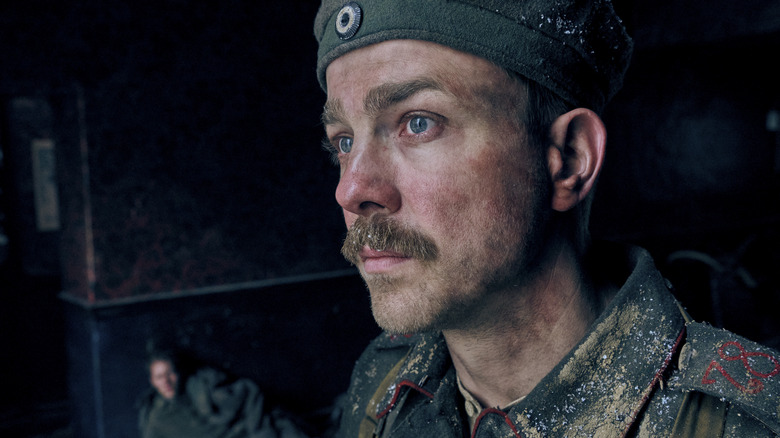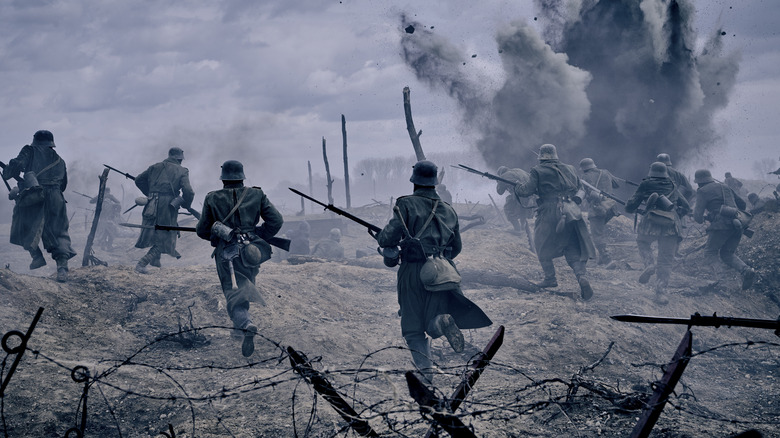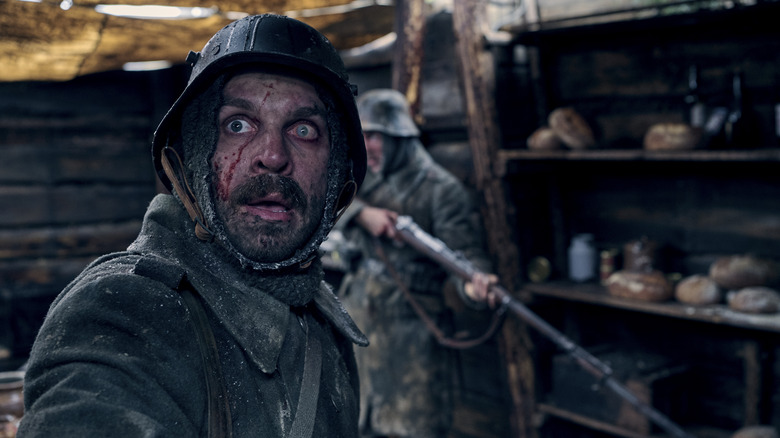All Quiet On The Western Front Is A Fiction, But The Horror Of World War I Is All Too Real
War is hell, but a surprising number of movies about war seem to glorify it. Even movies that are anti-war frequently have heroic characters or heroic moments, making them inspiring stories of human endurance. Few delve into the fact that war is always horrible, moments of heroism are overshadowed by its misery, and there's nothing worth glorifying.
"All Quiet on the Western Front," Edward Berger's 2022 film adaptation of the 1929 novel of the same name, does just that, with harrowing moments of quiet misery punctuated by excruciating violence and chaos. The film is beautiful to look at, but it is also a singularly disturbing experience that exemplifies not only the horror of war but its pointless futility.
The novel "All Quiet on the Western Front" was written by World War I veteran Erich Maria Remarque just a few years removed from his own horrific experiences in the war. He collected the stories of his friends and combined them with his own experiences to create the fictional Paul Bäumer, a young German who lies about his age in order to join the army and go to war for his country, only to barely survive through unspeakable suffering. Berger's adaptation brings the painful message of the novel to life in a new way to create one of the best war movies of all time.
War is a pointless hell
"All Quiet on the Western Front" follows Paul (Felix Kammerer) as he goes through various battles and skirmishes in part of the French countryside now known as "No Man's Land." Though he was excited and proud to join the army, Paul quickly realizes that there is no glory to be had. He barely survives his first battle and is pulled from the rubble only to discover the corpse of his schoolmate nearby. It's rough stuff, but only becomes more horrific when Paul turns in the dog tag to be accounted for and it's added to a massive pile. Even without seeing piles of bodies or an incredible amount of death, we understand the magnitude of the carnage.
Both the film and novel highlight the fact that many of the soldiers had no hatred for the men they killed, and under other circumstances could have been friends or even kin. The soldiers fight one another because they were told to and it's a matter of survival, but they ultimately don't want to hurt anyone. In the novel, which was so shocking that Berger's teenage daughter told him that he had to make the film, Paul ends up killing a French soldier and lying beside his dying body, where he realizes that in another life, the man could "be my brother."
A distinctly German angle
Berger brought his perspective as a German to the film because Germans do not celebrate their involvement in either of the World Wars. In an interview with /Film, the director explained that he felt it was important for a German to tackle the adaptation:
"[In American and British war films] you're allowed to tell a story of people that also did something with purpose that were probably broken just as much as soldiers from other countries, but they were allowed to heal. They had a sense of pride and a sense of honor about what they did. There's nothing honorable or to be proud about in terms of that part of German history. So, you can just feel shame and guilt and terror and a sense of responsibility towards that history. And I feel it. It's in my DNA, and that made the film."
There are no heroes or victories in "All Quiet on the Western Front." Even though Paul survives and eventually discovers that the war has ended, he's clearly been forever changed. The trauma of his experience will haunt him for the rest of his days, and beyond that, Europe won't heal in the wake of the war. After all, even though World War I was supposed to be "the war to end all wars," Germany would soon be at the center of another global tragedy in World War II, less than two decades later.
"All Quiet on the Western Front" is an important and timely reminder that in war, there are no winners.


